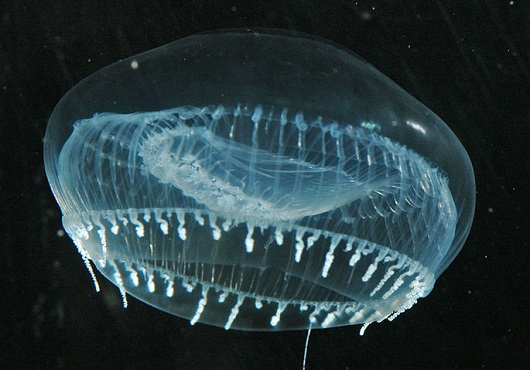1.5 million Euro grant for groundbreaking work with luminescent jellyfish

A researcher at the University of St Andrews has been awarded a 1.5 million Euro grant by the European Research Council to further advance groundbreaking work with bioluminescent jellyfish.
The five year Advanced Bioderived and Biocompatible Lasers (ABLASE) project led by Professor Malte Gather starts this month and will develop lasers based on single cells.
In earlier research Professor Gather found that the green fluorescent protein molecules jellyfish produce can be used to turn individual human kidney cells into tiny lasers. The discovery earned an entry in the Guinness World Records for the first living laser.
Recent work has involved developing tiny solid-state lasers with record performance from fluorescent proteins found in the jellyfish.
Professor Gather said: “Both the living lasers based on single cells and the solid-state protein lasers are intrinsically biocompatible, thus offering unique properties not shared by any existing laser.
“However, the physical processes involved in lasing from fluorescent proteins remain poorly understood and so far biological lasers rely on impractical resonators for optical feedback.”
Under the ABLASE project the Soft Matter Photonics Group led by Prof Gather will develop for the first time a detailed understanding of stimulated emission and lasing in fluorescent proteins.
Building on this, the team will then develop applications of biological lasers for biomedical research, where they are expected to serve as powerful microscopic and biocompatible imaging probes and as sensors for biomolecules.
The project is inter-disciplinary by its very nature, bridging photonics, genetic engineering and material science.
The Soft Matter Photonics Group, which develops new photonic tools for the life sciences, was established at the School of Physics and Astronomy at the University of St Andrews in autumn 2013 with funds from the second phase of the Scottish University Physics Alliance and from other national and international funding bodies including the Human Frontier Science Program and the European Commission Seventh Framework Programme.
The members of the group have diverse academic backgrounds ranging from physics to biology to chemistry. Professor Gather has previously led research groups at TU Dresden in Germany and worked at Harvard Medical School in the United States.
Notes to news editors
Photographs are available. Professor Gather is available for interview. Contact Communications Office.
Issued by the University of St Andrews Communications Office, contactable on 01334 467310 or proffice@st-andrews.ac.uk.
Category Research